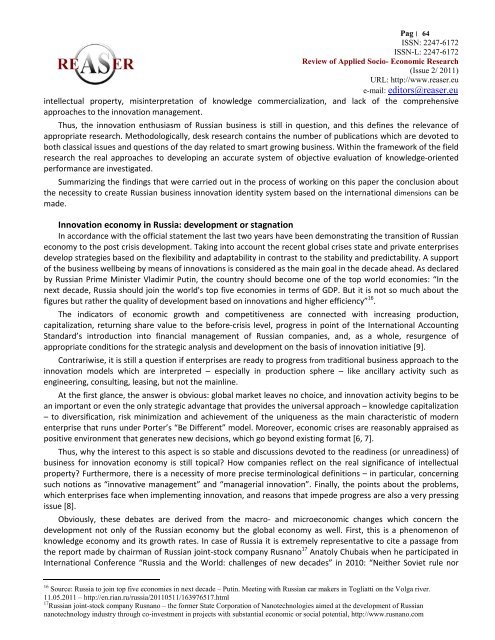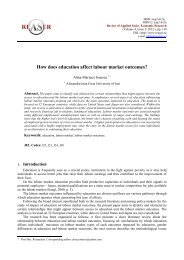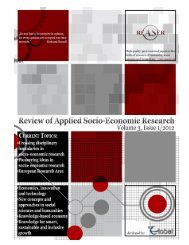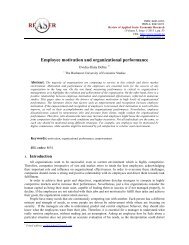Volume 2, ISSUE2/2011 - Review of Applied Socio-Economic ...
Volume 2, ISSUE2/2011 - Review of Applied Socio-Economic ...
Volume 2, ISSUE2/2011 - Review of Applied Socio-Economic ...
Create successful ePaper yourself
Turn your PDF publications into a flip-book with our unique Google optimized e-Paper software.
Pag׀ 64 ISSN: 2247-6172ISSN-L: 2247-6172<strong>Review</strong> <strong>of</strong> <strong>Applied</strong> <strong>Socio</strong>- <strong>Economic</strong> Research(Issue 2/ <strong>2011</strong>)URL: http://www.reaser.eue-mail: editors@reaser.euintellectual property, misinterpretation <strong>of</strong> knowledge commercialization, and lack <strong>of</strong> the comprehensiveapproaches to the innovation management.Thus, the innovation enthusiasm <strong>of</strong> Russian business is still in question, and this defines the relevance <strong>of</strong>appropriate research. Methodologically, desk research contains the number <strong>of</strong> publications which are devoted toboth classical issues and questions <strong>of</strong> the day related to smart growing business. Within the framework <strong>of</strong> the fieldresearch the real approaches to developing an accurate system <strong>of</strong> objective evaluation <strong>of</strong> knowledge-orientedperformance are investigated.Summarizing the findings that were carried out in the process <strong>of</strong> working on this paper the conclusion aboutthe necessity to create Russian business innovation identity system based on the international dimensions can bemade.Innovation economy in Russia: development or stagnationIn accordance with the <strong>of</strong>ficial statement the last two years have been demonstrating the transition <strong>of</strong> Russianeconomy to the post crisis development. Taking into account the recent global crises state and private enterprisesdevelop strategies based on the flexibility and adaptability in contrast to the stability and predictability. A support<strong>of</strong> the business wellbeing by means <strong>of</strong> innovations is considered as the main goal in the decade ahead. As declaredby Russian Prime Minister Vladimir Putin, the country should become one <strong>of</strong> the top world economies: “In thenext decade, Russia should join the world's top five economies in terms <strong>of</strong> GDP. But it is not so much about thefigures but rather the quality <strong>of</strong> development based on innovations and higher efficiency” 16 .The indicators <strong>of</strong> economic growth and competitiveness are connected with increasing production,capitalization, returning share value to the before-crisis level, progress in point <strong>of</strong> the International AccountingStandard’s introduction into financial management <strong>of</strong> Russian companies, and, as a whole, resurgence <strong>of</strong>appropriate conditions for the strategic analysis and development on the basis <strong>of</strong> innovation initiative [9].Contrariwise, it is still a question if enterprises are ready to progress from traditional business approach to theinnovation models which are interpreted – especially in production sphere – like ancillary activity such asengineering, consulting, leasing, but not the mainline.At the first glance, the answer is obvious: global market leaves no choice, and innovation activity begins to bean important or even the only strategic advantage that provides the universal approach – knowledge capitalization– to diversification, risk minimization and achievement <strong>of</strong> the uniqueness as the main characteristic <strong>of</strong> modernenterprise that runs under Porter’s “Be Different” model. Moreover, economic crises are reasonably appraised aspositive environment that generates new decisions, which go beyond existing format [6, 7].Thus, why the interest to this aspect is so stable and discussions devoted to the readiness (or unreadiness) <strong>of</strong>business for innovation economy is still topical? How companies reflect on the real significance <strong>of</strong> intellectualproperty? Furthermore, there is a necessity <strong>of</strong> more precise terminological definitions – in particular, concerningsuch notions as “innovative management” and “managerial innovation”. Finally, the points about the problems,which enterprises face when implementing innovation, and reasons that impede progress are also a very pressingissue [8].Obviously, these debates are derived from the macro- and microeconomic changes which concern thedevelopment not only <strong>of</strong> the Russian economy but the global economy as well. First, this is a phenomenon <strong>of</strong>knowledge economy and its growth rates. In case <strong>of</strong> Russia it is extremely representative to cite a passage fromthe report made by chairman <strong>of</strong> Russian joint-stock company Rusnano 17 Anatoly Chubais when he participated inInternational Conference “Russia and the World: challenges <strong>of</strong> new decades” in 2010: “Neither Soviet rule nor16 Source: Russia to join top five economies in next decade – Putin. Meeting with Russian car makers in Togliatti on the Volga river.11.05.<strong>2011</strong> – http://en.rian.ru/russia/<strong>2011</strong>0511/163976517.html17 Russian joint-stock company Rusnano – the former State Corporation <strong>of</strong> Nanotechnologies aimed at the development <strong>of</strong> Russiannanotechnology industry through co-investment in projects with substantial economic or social potential, http://www.rusnano.com








